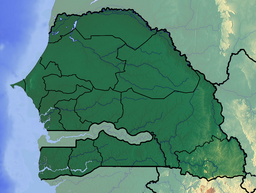geo.wikisort.org - Reservoir
Lac Rose (meaning Pink Lake) lies north of the Cap Vert peninsula of Senegal, some 30 km (18 miles) north-east of the capital, Dakar,[1] in northwest Africa.[2] It is named for its pink waters caused by Dunaliella salina algae and is known for its high salt content, up to 40% in some areas.
| Lac Rose | |
|---|---|
 Lake shore | |
 Lac Rose | |
| Location | Cap Vert Peninsula |
| Coordinates | 14°50′18.02″N 17°14′41.36″W |
| Type | Saline lake |
| Basin countries | Senegal |
| Surface area | 3 km2 (1 sq mi) |
| Max. depth | 3 metres (9.8 ft) |


Description
The lake is separated from the Atlantic Ocean only by a narrow corridor of dunes, and is named for its pink waters, which are caused by Dunaliella salina algae. The algae produce a red pigment to help them absorb sunlight, which gives them energy to create ATP.[3] The color is particularly visible during the dry season (from November to May) and less visible during the rainy season (June to October).[4]
Magenta coloured samphire bushes flourish in the lake’s white sandbanks; the sand dunes are terra-cotta-coloured.[citation needed]
Salt
The lake is known for its high salt content (up to 40% in some areas), which is mainly due to the ingress of seawater and its subsequent evaporation.[3] Like the Dead Sea, the lake is sufficiently buoyant that people can float easily.[1][2][5]
Salt is exported across the region by up to 3,000 collectors, men and women from all over Western Africa, who work 6–7 hours a day. They protect their skin with beurre de Karité (shea butter), an emollient produced from Shea nuts which helps avoid tissue damage. The salt is used by Senegalese fishermen to preserve fish, which is an ingredient in many traditional recipes, including the national dish, which is a fish and rice combination called thieboudienne.[1][6] About 38,000 tonnes of salt are harvested from this lake each year, which contributes to Senegal’s salt production industry. Senegal is the number-one producer of salt in Africa.[7]

Wildlife
Despite the high salinity of the lake, which can reach as high as 350 g/L during the dry season, blackchin tilapia have been found living in brackish sections fed fresh water by an intermittent creek.[8][9][10]
World heritage
Lake Retba is under consideration by UNESCO as a World Heritage Site.[6]
Motorsport
The lake was often the finishing point of the Dakar Rally, before the rally moved to South America in 2009.[5] In 2021, it hosted a round of the Extreme E electric off-road racing series.
See also
- Lake Hillier
- Sir Michael Tippett, who composed The Rose Lake after seeing it.
 Lakes portal
Lakes portal
Further reading
- "A Look at Lake Retba, Senegal's Pink Lake". Edward Asare. 5 May 2021.
References
- Handayani, Wuri; Paramitha, Tasya (19 June 2012). "Danau Pink, Sensasi Wisata Apung di Senegal". VIVAnews (in Indonesian). Archived from the original on 14 August 2012. Retrieved 19 June 2012.
- "How salt miners save Senegal's Pink Lake". BBC News Online. 19 August 2013.
- "Lake Retba in Senegal Looks Like A Giant Strawberry Milkshake". HuffPost. UK. 5 June 2012. Retrieved 9 November 2019.
- "22 Epic Places You Didn't Know Existed". HuffPost. 26 October 2013. Retrieved 9 November 2019.
- "Lake Retba". Atlas Obscura. Retrieved 23 May 2013.
- Eddy, Jody (14 March 2014). "Swim a Pink Lake in Senegal". The Wall Street Journal.
- Kanoute, Pape Tahirou; Malan, Christiane; Stephane, Fournier; Teyssier, Catherine (2018). "Relevance of a Geographical Indication for Salt From Senegal's Pink Lake" (PDF). Rome: FAO: 16pp.
{{cite journal}}: Cite journal requires|journal=(help) - Garnier, J. M.; Gaudant, J. (1984). "Occurrence of Sarotherodon melanotheron Rueppell (teleostean fish, Cichlidae) in hyperhaline waters of Retba lake (Senegal) [Tilapia hendelotii]". Comptes Rendus de l'Académie des Sciences Série 3 Sciences de la Vie (France) (in French). ISSN 0249-6313.
- Paugy, Didier; Lévêque, Christian; Otero, Olga (10 November 2017). The Inland Water Fishes of Africa: Diversity, Ecology and Human Use.
- Paugy, Didier; Levêque, Christian (2017), "Fish communities in small aquatic ecosystems: caves, gueltas, crater and salt lakes", The inland water fishes of Africa, IRD Éditions, pp. 397–415, doi:10.4000/books.irdeditions.25253, ISBN 9782709924009, retrieved 4 February 2022
External links
- Lake Retba
- Senegal’s Pink Lake. Al Jazeera English, October 2021 (video, 46 mins)
На других языках
[de] Retba-See
Lac Retba, auch Lac Rose genannt, ist ein Salzsee in Senegal. Er liegt 35 km nordöstlich der Hauptstadt Dakar nahe der Atlantikküste.- [en] Lake Retba
[es] Lago Rosa
El lago Rosa (conocido localmente como Lac Retba) se encuentra al norte de la península senegalesa de Cabo Verde, al noreste del país africano. Dista 35 kilómetros de Dakar.[1] Cubre una superficie de 3 km².[1][fr] Lac Rose
Le lac Rose, ou lac Retba pour les Peuls, est une lagune côtière fermée, c'est-à-dire coupée de la mer, situé au Sénégal, à proximité immédiate de Dakar. Le « Lac » s'étend sur environ 3 km2, avec une profondeur faible. Ces eaux sont salées et ont une teinte rose en raison de la présence d'une algue microscopique.[it] Lago Retba
Il lago Retba o lac Rose è un lago del Senegal che si trova a nord della penisola del Senegal, a nord est di Dakar. Ha una larghezza massima di 1,5 km ed è lungo 5 km. Dista circa un chilometro dall'Oceano Atlantico. Esso è chiamato così per le sue acque rosa, causate da alghe (Dunaliella salina) presenti nell'acqua che producono un pigmento rosso, il carotene, per resistere al forti raggi solari. Il colore è particolarmente visibile durante la stagione secca.[ru] Ретба
Ре́тба — озеро в Сенегале, расположено в 20 км к северо-востоку от полуострова Зелёный мыс. Площадь — 3 км². Максимальная глубина — 3 метра.Другой контент может иметь иную лицензию. Перед использованием материалов сайта WikiSort.org внимательно изучите правила лицензирования конкретных элементов наполнения сайта.
WikiSort.org - проект по пересортировке и дополнению контента Википедии